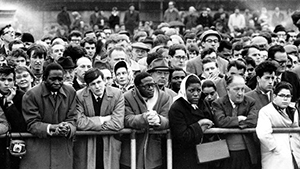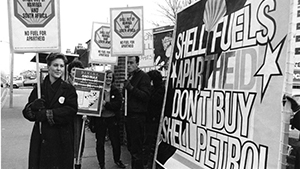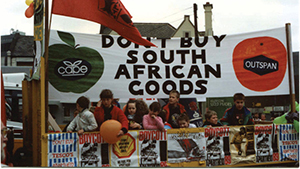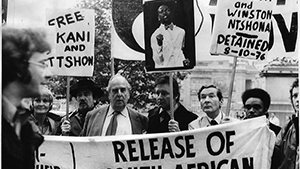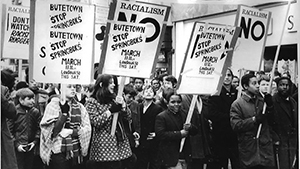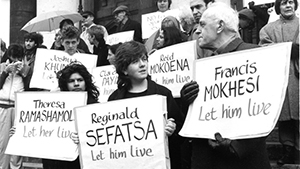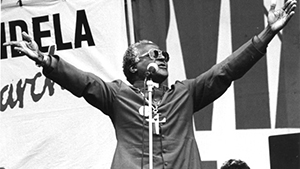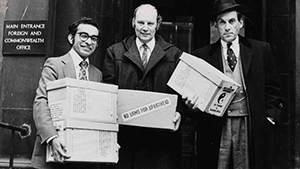Campaigns run by the Anti Apartheid Movement
The Anti-Apartheid Movement campaigned against the supply of weapons and for an end to all military collaboration with South Africa. In the early 1960s Britain was South Africa’s major arms supplier. The 1964–70 Labour government imposed an arms embargo, but continued to supply spare parts for weapons like Buccaneer bombers.
THE DISINVESTMENT CAMPAIGN
Most big British companies had subsidiaries operating in South Africa and Namibia. From the late 1960s the Anti-Apartheid Movement campaigned to persuade them to pull out. It exposed the ways in which they supported apartheid and asked organisations and individuals to sell their shares. From 1970 one of the AAM’s main targets was Barclays Bank.
LUTHULI’S APPEAL
The Anti-Apartheid Movement began as the Boycott Movement, set up in 1959 to persuade shoppers to boycott apartheid goods. It invoked Chief Albert Luthuli’s appeal for an international boycott of South African products.
POLITICAL TRIALS
The Anti-Apartheid Movement campaigned for political prisoners in South Africa and Namibia, seeking their release and letting them know they were not forgotten.
SOUTH AFRICA EXPELLED FROM THE OLYMPICS
By 1990, South Africa had been expelled from every major world sports federation. In the 1960s the Anti-Apartheid Movement worked with the South African Non-Racial Olympic Committee (SANROC) to get South Africa excluded from the 1964 Tokyo Olympics.
SWAPO LEADERS SENTENCED TO HANG
In 1964 a worldwide campaign saved the lives of Nelson Mandela and the other Rivonia trialists. At the UN a General Assembly resolution called for their release and a petition signed by hundreds of thousands of people all over the world asked the South African government to abandon political trials.
THE RIVONIA TRIAL
In 1964 Nelson Mandela and seven other leaders of the African National Congress and Umkhonto we Sizwe were sentenced to life imprisonment. International pressure helped save them from the death penalty.
LOBBYING GOVERNMENT
The Anti-Apartheid Movement lobbied Labour and Conservative governments directly, as well as building a mass movement to change government policy. It sought meetings with ministers, raised issues in letters and memoranda, and gave evidence to parliamentary inquiries.

